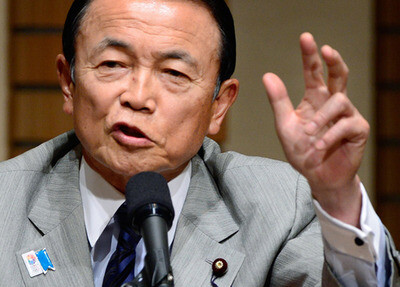hankyoreh
Links to other country sites 다른 나라 사이트 링크
Japanese politician retracts comments on Nazis

By Jeong Nam-ku, Tokyo correspondent
Deputy Prime Minister of Japan Taro Aso finally retracted remarks he had made implying that Japan should learn from the techniques that the Nazi regime used to revise the German constitution. The remarks had generated a negative reaction around the world.
“I regret the fact that I unintentionally caused misunderstanding, and I take back my use of the Nazi regime as an example,” Taro told Japanese reporters on August 1.
“I had brought up the situation with the Wiemar Constitution during the Nazi regime as a bad example of how constitutional reform might take place without adequate understanding and discussion by the people,” Taro tried to explain.
According to the Asahi Shimbun, Aso retracted the remarks in an attempt to get control of the situation after criticism increased both in Japan and internationally.
On July 29, Aso said, “Constitutional reform must be done quietly. The Weimar Constitution was replaced with the Nazi Constitution before anyone realized it. Perhaps Japan should learn from that approach.”
Aso’s highly controversial remarks about sensitive historical topics were reported in media around the world, triggering a flood of complaints and criticism.
The Simon Wiesenthal Center, a Jewish human rights organization that is based in Los Angeles, released a statement on July 30 censuring Aso’s remarks.
“What ‘techniques’ from the Nazis’ governance are worth learning - how to stealthily cripple democracy?” Rabbi Abraham Cooper, associate dean of the Simon Wiesenthal Center, was quoted as saying in the statement. “Has Vice Prime Minister Aso forgotten that Nazi Germany‘s ascendancy to power quickly brought the world to the abyss and engulfed humanity in the untold horrors of World War II?”
“It is obvious how remarks such as these will come across to people of countries near Japan that were the victims of its imperial aggression,” Korean Ministry of Foreign Affairs spokesperson Cho Tae-young said on July 30.
And on July 31, Chinese Foreign Ministry spokesperson Hong Lei said, “When a Japanese leader openly talks about learning from the Nazi constitution, it draws attention to the direction that Japan is moving in.”
There has also been ongoing criticism of the remarks in Japan. In a statement released on July 31 under the name of secretary-general Seiji Mataichi, the Social Democratic Party of Japan announced that it “harshly denounced” the comments and demanded that Aso retract them and resign from his position as lawmaker.
“This is not a problem that can be dismissed as an individual’s remarks,” said Akihiro Ohata, acting president of the Democratic Party of Japan, on Aug. 1. “The Shinzo Abe administration must let its opinion be known.”
On August 1, Chief Cabinet Secretary and government spokesperson Yoshihide Suga, tried to calm the controversy by saying that “the Abe cabinet does not view the Nazi government in a positive light.”
Please direct questions or comments to [english@hani.co.kr]

Editorial・opinion
![[Column] Park Geun-hye déjà vu in Yoon Suk-yeol [Column] Park Geun-hye déjà vu in Yoon Suk-yeol](https://flexible.img.hani.co.kr/flexible/normal/500/300/imgdb/original/2024/0424/651713945113788.jpg) [Column] Park Geun-hye déjà vu in Yoon Suk-yeol
[Column] Park Geun-hye déjà vu in Yoon Suk-yeol![[Editorial] New weight of N. Korea’s nuclear threats makes dialogue all the more urgent [Editorial] New weight of N. Korea’s nuclear threats makes dialogue all the more urgent](https://flexible.img.hani.co.kr/flexible/normal/500/300/imgdb/original/2024/0424/7317139454662664.jpg) [Editorial] New weight of N. Korea’s nuclear threats makes dialogue all the more urgent
[Editorial] New weight of N. Korea’s nuclear threats makes dialogue all the more urgent- [Guest essay] The real reason Korea’s new right wants to dub Rhee a founding father
- [Column] ‘Choson’: Is it time we start referring to N. Korea in its own terms?
- [Editorial] Japan’s rewriting of history with Korea has gone too far
- [Column] The president’s questionable capacity for dialogue
- [Column] Are chaebol firms just pizza pies for families to divvy up as they please?
- [Column] Has Korea, too, crossed the Rubicon on China?
- [Correspondent’s column] In Japan’s alliance with US, echoes of its past alliances with UK
- [Editorial] Does Yoon think the Korean public is wrong?
Most viewed articles
- 1‘We must say no’: Seoul defense chief on Korean, USFK involvement in hypothetical Taiwan crisis
- 2N. Korean delegation’s trip to Iran shows how Pyongyang is leveraging ties with Moscow
- 3‘Weddingflation’ breaks the bank for Korean couples-to-be
- 4Korea sees more deaths than births for 52nd consecutive month in February
- 546% of cases of violence against women in Korea perpetrated by intimate partner, study finds
- 6[Column] Park Geun-hye déjà vu in Yoon Suk-yeol
- 7Will NewJeans end up collateral damage in internal feud at K-pop juggernaut Hybe?
- 8Amnesty notes ‘erosion’ of freedom of expression in Korea in annual human rights report
- 9[Editorial] New weight of N. Korea’s nuclear threats makes dialogue all the more urgent
- 10[Column] Yoon’s first 100 days should open our eyes to pitfalls of presidential system